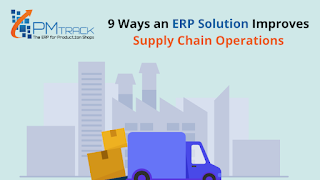9 Ways an ERP Solution Improves Supply Chain Operations
Plastic products are always in high demand, and these industries must deliver large quantities of their products. Maintaining heavy machinery,
The distribution and manufacturing industries are constantly being disrupted by digital transformation, putting pressure on organizations to find advanced solutions in order to stay on top of their daily business processes and ahead of their competition. Predictive analytics and the Internet of Things (IoT) have transformed how businesses manage their supply chains And the changes are just getting started.
Supply chain management is critical to an organization’s overall success. Many manufacturers, for example, rely on vendors to provide them with the right type and number of resources at the right time to keep production moving along as planned. However, according to a recent State of Manufacturing report, “97 percent of respondents report that supply chain management consumes a significant amount of employee time.” That being said, if not managed efficiently, supply chain management can be a time-consuming process – just consider the reduced productivity, cause of delays, impacted quality, and unnecessary expenses and profit losses.
Let’s take a step back and consider your organization. Where do you see your company in a year’s time?
Are you benefiting from increased revenue and efficiency as a result of a cutting-edge supply chain, or are you struggling to make ends meet with legacy systems? This is where modern Enterprise Resource Planning (ERP) software can take your company to the next level – by simplifying and optimizing your supply chain management processes for smoother and more profitable outcomes.
Here are nine ways an ERP solution improves supply chain operations:
- Automate Purchasing Process
Keeping a close eye on inventory is critical to avoiding excess or shrinkage, but this monitoring takes time. Advanced ERP systems with supply chain management capabilities can automate this process. When inventory levels fall below a certain threshold, the user is notified. This allows you to stay informed about the need to replenish stock and place orders with vendors accordingly.
- Greater Data Insight
The health of a supply chain is heavily reliant on timely and accurate information. A modern ERP system can store a massive amount of real-time data about inventory, purchasing, selling, financial accounting, employees, and other core business functions. The software also provides users with continuous access to reports, resulting in greater insight into the operations and making supply-demand management much easier.
- Streamline Core Functions
ERP software is comprehensive management software that integrates and manages various business operations in a supply chain, such as HR, finance, management, and sales, through a single system. This reduces manual paperwork and improves data visibility across the enterprise. Furthermore, the system enables automation, significantly reducing processing and administration-related wait times in the supply chain.
- Establish Process Standardization
A standardized process is essential for the success of any supply chain strategy. An ERP solution aids in the development of this consistency across teams in single and multiple locations. This improves overall system efficiency, process accuracy and teamwork, and reduces errors caused by miscommunication.
- Increase Transparency
Implementing an ERP solution provides management with a consolidated view of all aspects of supply chain operations. It provides accurate, relevant, and up-to-date information about a shipment in transit, where it is, and when it will arrive at the warehouse. Additionally, employees in the stores and warehouses can have role-based access to this knowledge, ensuring that consistent and accurate information is shared with all relevant people throughout the organization.
- Real-Time Inventory Management
Inventory is an essential component of any supply chain setup. Proper management of it can reduce costs while increasing the business’s turnover.
Inventory is traditionally captured using spreadsheets and hand-checked lists. This falls short in terms of providing error-free tracking and up-to-date data. Modern ERP software, on the other hand, includes features that allow for real-time visibility of exact inventory levels. As a result, the supply chain operates at peak efficiency, with lower overhead costs and fewer order fulfillment communication errors.
- Decrease Delay
An ERP system is a centralized repository for all information. As a result, the tool provides businesses with greater data transparency and enables them to efficiently allocate resources such as material, personnel, and machines early in the planning process. It allows for better coordinated and executed activities, resulting in on-time delivery throughout the supply chain.
- Raise Cost Awareness
Variable costs occur at every stage of the supply chain. Intelligent ERP systems can generate more realistic cost projections by leveraging supply and demand data. This raises cost awareness among managers, allowing them to identify and reduce uncontrollable factors that incur additional expenses, optimise processes, and reduce operational costs.
- Upgrade Returns Management
Supply chain processes dealing with returned goods and backorder processing are just as important for logistics companies as shipping products to customers. Returns management is simplified by effective ERP solutions. They enable businesses to have better control over returned products by redoing each process, such as inspection, quality control, packaging, and shelving. A better return management system can help businesses reduce waste and improve backorder processing consistency.
You should now understand how an ERP system can help your supply chain operations. PMTRACK ERP ERP offers ground-breaking features and unrivalled mobility. Click here to schedule a demo or consultation to learn more about how these work.




Comments
Post a Comment